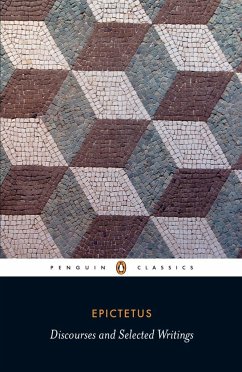A new translation of the influential teachings of the great Stoic philosopher DESPITE BEING BORN into slavery, Greco-Roman philosopher Epictetus became one of the most influential thinkers of his time. "Discourses and Selected Writings" is a transcribed collection of informal lectures given by the philosopher around AD 108. A gateway into the life and mind of a great intellectual, it is also an important example of the usage of Koine or ?common? Greek, an ancestor to Standard Modern Greek.
Epictetus, a Greek stoic and freed slave, ran a thriving philosophy school in Nicropolis in the early second century AD. Together with the "Enchiridion", a manual of his main ideas, this book argues that happiness lies in learning to perceive exactly what is in our power to change and what is not.
Epictetus, a Greek stoic and freed slave, ran a thriving philosophy school in Nicropolis in the early second century AD. Together with the "Enchiridion", a manual of his main ideas, this book argues that happiness lies in learning to perceive exactly what is in our power to change and what is not.

